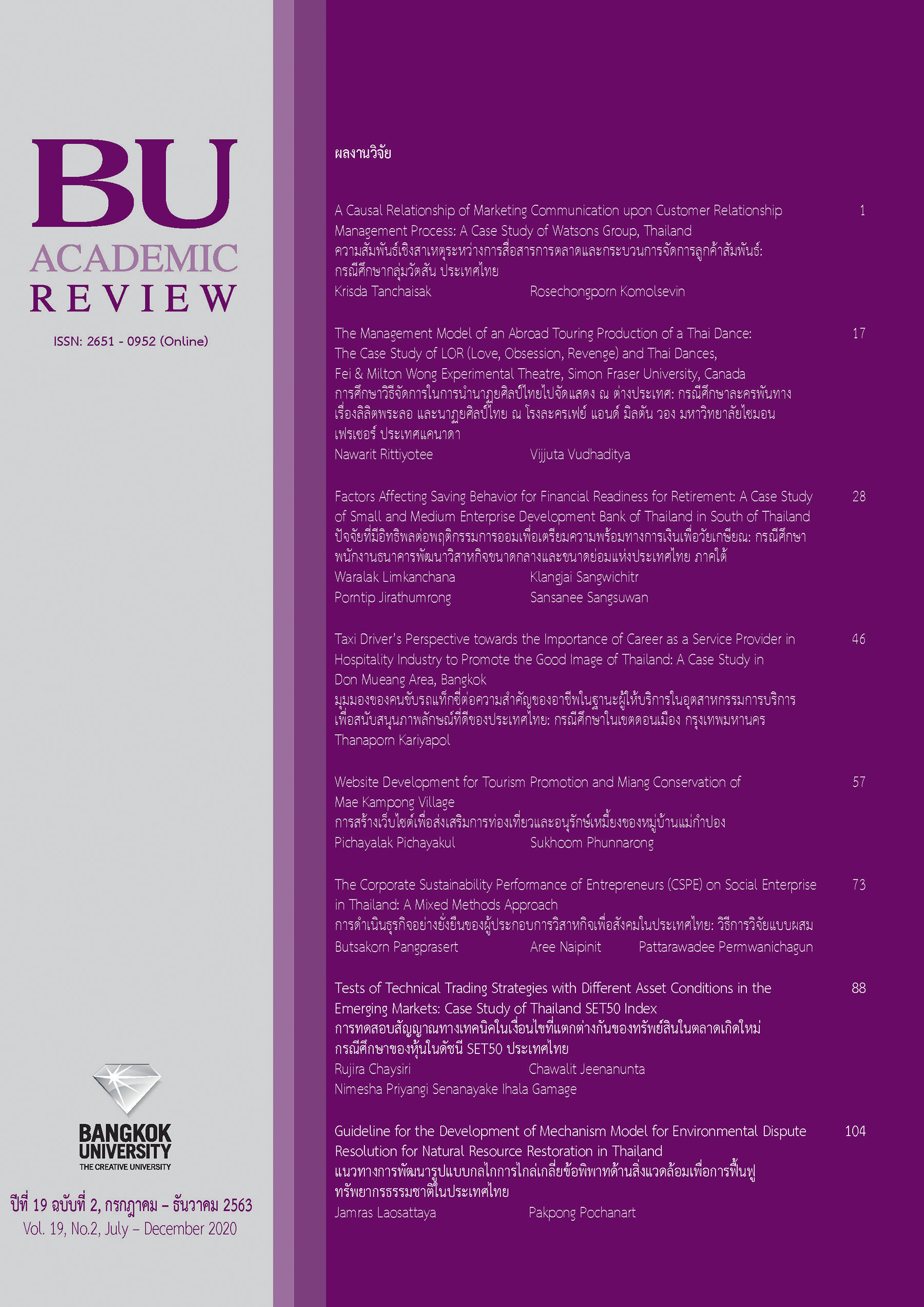Guidelines for Waste Management in the Plastics Industry in Thailand
Main Article Content
Abstract
The objective of this research was to study the states and problems of waste minimization in Thailand’s plastics industry, and to apply the approach of waste management solution in the plastics industry in Thailand. This qualitative research employed structured interviews for data collection. There are eight key informants, consisting of a CEO, manager, business representative, academician, and expert who are specialized in thermoplastic injection molding machines. All of them were selected by using snowball sampling. The data collected from the interviews were analyzed, synthesized, and concluded. Based on the literature review on waste minimization methods employed in Thailand’s plastics industry and the interview results, four factors were derived: (1) production management, (2) loss reduction in the production system, (3) waste reduction in the production system, and (4) machine-operation behaviors.
Article Details
The manuscript submitted for publication must be the original version, submitted only to this particular journal with no prior acceptance for publication elsewhere in other academic journals. The manuscript must also not violate the copyright issue by means of plagiarism.
References
Adjerid, I., Acquisti, A., Telang, R., Padman, R., & Adler-Milstein, J. (2015). The impact of privacy regulation and technology incentives: The case of health information exchanges. Management Science, 62(4), 1042–1063.
Albrechtsen, E., & Hokstad, P. (2013). An analysis of barriers in train traffic using risk influencing factors. In Bedford & van Gelder (eds.), Proceedings ESREL 2003, Safety and Reliability (pp. 25-31). Maastricht, Netherlands: CRC Press.
Androniceanu, A. (2017). The three-dimensional approach of total quality management, an essential strategic option for business excellence. The Amfiteatru Economic, 19(44), 61-78.
Aven, T. (2008). Risk analysis: Assessing uncertainties beyond expected values and probabilities. Chichester, UK: John Wiley & Sons, Ltd.
Mauch, C. (2016). A future without waste? Zero waste in theory and practice. Munich, Germany: Rachel Carson Center for Environment and Society.
Duijm, N. J. (2016). Safety-barrier diagrams as a safety management tool. Reliability Engineering and System Safety, 94(2), 332– 341.
Fayol, H. (2013). General and industrial management. London: Martino Fine Books
Federation of Thai Industries. (2019). Sarup phāwa sētthakit ʻutsāhakam Thai pī læ nǣonōm pī [Summary of Thai industrial economy in 2019 and outlook for 2020]. Retrieved September 19, 2020, from https://www.ryt9.com/s/oie/3086947
Gutberlet, J. (2016). Urban recycling cooperatives: Building resilient communities. New York:
Routledge.
Harry, M. J. (1998). Six sigma: A breakthrough strategy for profitability. Quality Progress, 31(5), 60-64.
Issarapong, N., Taengphukieo, R., To-on, P., Chareatratchai, U., & Khumla, P. (2018). Kānlot wēlā nai
krabūankān phalit dūai nǣokhit kānphalit bǣplīn: kō̜ranī sưksā kānphalit yāng rēdīalō̜
[Production time reduction using lean manufacturing concepts: A case study of radial tire
manufacturing]. APHEIT Journal, 8(1), 76-90.
Jackson, B. (2013). Seven wastes. Retrieved September 14, 2017, from http://www.results.wa.gov/sites/default/files/The%207%20Wastes.pdf
Jantasart, R. (2018). Patčhai lī nathīsong phon tō̜ kānlot khwām sūnplao læ phœ̄m khunkhā khō̜ng phū hai bō̜rikān khonsong læ kānkhlang sinkhā [The Lean factors affecting for waste reduction and value added of transportation and warehousing service provider] (Doctoral dissertation, Sripatum University).
Kjellén, U., (2000). Prevention of accidents through experience feedback. London, New York: Taylor & Francis.
Lagat, C., Koech, J., & Kemboi, A. (2016). Supply chain management practices, customer satisfaction and customer loyalty. European Journal of Business and Management, 8(21), 1-11.
Leanman. (2015). Lean manufacturing tools. Retrieved September 19, 2020, from http://leanmanufacturingtools.org/wp-content/uploads/2015/05/5S-Program.pdf
Ministry of Industry. (2005). Khō̜ nænam nai kān patibat tām kot krasūng phangmư̄ang [Recommendations for the implementation of the ministerial regulations and planning]. Bankkok: Department of Public Works and Town & Country Planning.
Nunsupawat, R. (2016). ʻEkkasān sammanākān phatthanā ngān dōi nǣokhit bǣplīn [Work development seminar document lean concept]. Chiang Mai: Nursing Services Center, Faculty of Nursing Chiang Mai University.
Robbins, S. P., & Coulter, M. (2018). Management (14th ed.). Hoboken N.J.: Pearson Education.
Tucek, D., & Hrbackova, L. (2019). Trends in risk-based thinking and risk management methods in Czech plastic cluster production companies. International Advances in Economic Research, 25(2), 245-246.
Zaman, A. U. (2014). Roadmap towards zero waste cities. Retrieved September 19, 2020, from https://www.longdom.org/open-access/roadmap-towards-zero-waste-cities-2252-5211.1000e106.pdf


